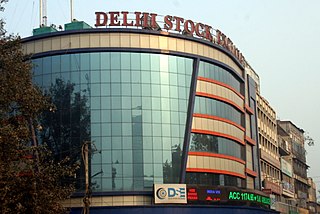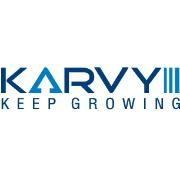Related Research Articles

A security is a tradable financial asset. The term commonly refers to any form of financial instrument, but its legal definition varies by jurisdiction. In some countries and languages people commonly use the term "security" to refer to any form of financial instrument, even though the underlying legal and regulatory regime may not have such a broad definition. In some jurisdictions the term specifically excludes financial instruments other than equity and fixed income instruments. In some jurisdictions it includes some instruments that are close to equities and fixed income, e.g., equity warrants.

The Securities and Exchange Board of India (SEBI) is the regulatory body for securities and commodity market in India under the administrative domain of Ministry of Finance within the Government of India. It was established on 12 April 1988 as an executive body and was given statutory powers on 30 January 1992 through the SEBI Act, 1992.

A permanent account number (PAN) is a ten-character alphanumeric identifier Foundational ID, issued in the form of a laminated "PAN card", by the Indian Income Tax Department, to any person who applies for it or to whom the department allots the number without an application. It can also be obtained in the form of a PDF file known as e-PAN from the website of the Indian Income Tax Department.
The Madras Stock Exchange (MSE) was a stock exchange in Chennai, India. The now defunct MSE was the fourth stock exchange to be established in the country and the first in South India. It had a turnover (2001) of ₹ 3,090 crore, but was a fraction of the turnover generated by the Bombay Stock Exchange and National Stock Exchange of India. The turnover of the stock exchange was 19,907 Crore as of the financial year 2012.

Inter-connected Stock Exchange Ltd. (ISE) is an Indian national-level stock exchange. under the ownership of Ministry of Finance, Government of India. It is responsible for providing trading, clearing, settlement, risk management and surveillance support to its trading members. It started its operation in 1998 in Vashi, Mumbai, and has 841 trading members, who are located in 18 cities. These intermediaries are administratively supported through the regional offices at Delhi, Kolkata, Patna, Ahmedabad, Coimbatore and Nagpur, besides Mumbai.
A demat account is an Indian term for a dematerialized account that holds financial securities digitally for traded shares in the share market. In India, demat accounts are maintained by two depository organizations: the National Securities Depository Limited and the Central Depository Services Limited.
Cochin Stock Exchange was an Indian stock exchange in Kochi, Kerala fully owned by Government of India. It was incorporated in 1978. At its peak, it had almost 500 Indian companies listed, and with a daily turnover of ₹70–₹100 crore, it was the fourth largest exchange in India.

Delhi Stock Exchange (DSE) was a stock exchange located in New Delhi.
Saurashtra Kutch Stock Exchange Limited, popularly called Stock Exchange, or SKSE) is one of three Indian stock exchange in Gujarat. It is located at Sadar Bazaar, Rajkot, India. Saurashtra Kutch Stock Exchange Ltd was incorporated in July 1989 and got recognition from the Government of India. The recognition have been renewed from time to time by the Central Government and SEBI. It is under the ownership of Ministry of Finance of the Government of India.

National Securities Depository Limited (NSDL) is an Indian central securities depository, based in Mumbai. It was established in August 1996 as the first electronic securities depository in India with national coverage. It was established based on a suggestion by a national institution responsible for the economic development of India. At the end of 2023, its demat accounts held assets worth ₹398 Lakh Crore.
Tamilnad Mercantile Bank Limited (TMB) is an Indian bank headquartered at Thoothukudi, Tamil Nadu. TMB was founded in 1921 as the Nadar Bank, but changed its name to Tamilnad Mercantile Bank in November 1962 to widen its appeal beyond the Nadar community. The bank currently has 509 full branches throughout India, 12 regional offices and two link offices, two central processing centres, one service branch, four currency chests, 48 eLobby centres, 262 cash recycler machines and 1151 automated teller machines (ATM).

The United Stock Exchange of India (USE) is an Indian government owned stock exchange. It is the 4th pan India exchange launched for trading financial instruments in India. USE represents the commitment of 21 Indian public sector banks, private banks, international banks and corporate houses to build an institution of repute.
Indian Depository Receipt (IDR) is a financial instrument denominated in Indian Rupees in the form of a depository receipt. The IDR is a specific Indian version of the similar global depository receipts.
Religare Enterprises Limited (REL) is an Indian investment and financial services holding company, headquartered in New Delhi. REL is listed on National Stock Exchange of India and Bombay Stock Exchange. It is registered with the Reserve Bank of India (RBI).

Central Depository Services (India) Ltd. (CDSL) is an Indian central securities depository, founded in 1999.

Stock Holding Corporation of India Limited (SHCIL) is an Indian custodian and depository participant, based in Navi Mumbai, Maharashtra. SHCIL was established in 1986 as a public limited company and is a subsidiary of IFCI. It is also responsible for e-stamping system around India. It is also authorised by Reserve Bank of India as Agency Bank to distribute and receive Govt. of India savings/relief bond 2003 along with nationalized banks.
Angel One Limited, formerly known as Angel Broking Limited, is an Indian stockbroker firm established in 1996. The company is a member of the Bombay Stock Exchange, National Stock Exchange of India, National Commodity & Derivatives Exchange Limited and Multi Commodity Exchange of India Limited. It is a depository participant with Central Depository Services Limited (CDSL).

Karvy Group is a financial services company in India. It was involved in financial services like equity, commodities trading, depository and wealth services and distribution of other financial products. It has its headquarters in Hyderabad. It also had branch offices outside India in Bahrain, Dubai, Malaysia, Philippines and the United States.

National Academic Depository (NAD) is an initiative of government of India under the Ministry of Education (MoE), formerly the Ministry of Human Resource Development (MHRD). It is an online storehouse of academic awards viz. certificates, diplomas, degrees, mark-sheets etc. lodged by academic institutions / boards / eligibility assessment bodies in a digital format. NAD not only ensures easy access to and retrieval of an academic award but also validates and guarantees its authenticity and safe storage. In addition to ensuring the authenticity integrity, and confidentiality of the database, NAD can act as a deterrent to fake and forged paper certificates, reduce administrative efforts and eliminate the need of physical records. It facilitates students to get authentic documents/certificates in digital format directly from their original issuers anytime, anywhere without any physical interference.

Protean eGov Technologies Limited is an Indian technology company headquartered in Mumbai, India. The company focuses on developing digital public infrastructure (DPI) and e-governance initiatives for various governmental bodies in India. It works with central and state governments across multiple sectors including Tax Services, Social Security and Welfare, ID and Data Stack, Open Digital Ecosystem, and Cloud. In 2011, the company was appointed as a registrar for the Unique Identification Authority of India (UIDAI) to issue Aadhaar numbers to residents of the country.
References
- ↑ "SEBI registered Depository Participants of CSDL as on 29-02-2012" (PDF). Securities and Exchange Board of India. Retrieved 16 February 2014.
- ↑ "SEBI registered Depository Participants of NSDL as on 31-01-2012" (PDF). Securities and Exchange Board of India. Retrieved 16 February 2014.
- ↑ "NSDL".
- ↑ "CDSL - Central Depository Services (India) Limited". www.cdslindia.com. Retrieved 2022-12-22.